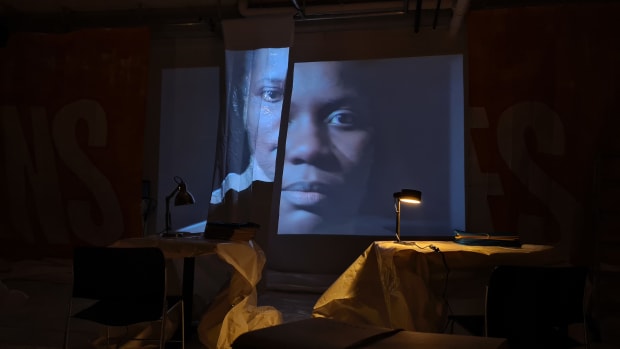
UvA students sue city of Amsterdam in a play
Two UvA law students are starring in the interactive play Edgelanders: Amsterdam on Trial. In this theatrical performance, a fictional lawsuit is initiated against Amsterdam for allegedly not doing enough for the shelter of undocumented migrants.
The five-part project Edgelanders: Amsterdam on Trial started in 2023, when artists Ehsan Fardjadniya and Raul Balai began collecting evidence against Amsterdam. According to them, based on a 2014 ruling by the European Court of Human Rights, the city would be obliged to provide unconditional shelter to everyone. So this includes undocumented refugees. By engaging in conversation with witnesses, refugees, critical citizens and politicians in the various chapters of the process, the artists flesh out the fictional lawsuit bit by bit.
In the fifth and final part of the project, The Indictment, the indictment is definitively formulated in collaboration with Alexia and Jonas, two UvA law students, based on the evidence gathered in the previous chapters. Eventually, they work towards a self-organised trial against Amsterdam, on 27 October 2025. The day the city celebrates its 750th anniversary. The message is clear: Amsterdam does not deserve a party.
Folia was able to attend the final rehearsal of The Indictment at Vlaams Cultuurhuis de Brakke Grond.
Pitch black
Just before the start of the performance, the tension is growing. Actors, directors and technicians pop out of the small theatre hall a few times, only to disappear again behind the heavy, black curtain. There, at the entrance to the auditorium where the test audience is waiting patiently, the performance is already beginning. Or rather, it is more of an experience than a performance. Phones are strictly forbidden inside, and are collected in a large cardboard box, before the audience is slowly being sent in, one by one. When the audience has managed to make their way through the tangle of blackout curtains they find themselves in an dark room.
The audience cannot see a thing, and the only audible sounds are the uncertainly shuffling feet of people searching for a spot to stand on the uneven floor. For minutes it remains silent. The darkness has a claustrophobic effect, and occasionally the hesitantly wandering audience gently bumps into each other. Finally, the silence is abruptly broken, and sound fragments echo around the room. Voices of asylum seekers reverberate through the darkness. A man who has lived in the Netherlands for 20 years without a passport, and therefore could not even return to his country of origin if he wanted to. A woman who had to give up her children. These tragic stories, experienced by distressed refugees who lost everything, should serve as evidence against the city.
The play Edgelanders: Amsterdam on Trial, Part V, The Indictment, can be seen from Thursday to Sunday, several times a day, in the white room of Vlaams Cultuurhuis de Brakke Grond as part of the festival Beyond the Black Box. Each performance lasts about 45 minutes, and there is room for up to nine visitors.
Exam room
A moment later, a door opens in the corner of the dark hall, inviting the audience to enter the next room. Once everyone's eyes are somewhat accustomed to the bright light again, it turns out that a kind of small exam room has been recreated here. Scattered throughout the bright orange-coloured room are nine old-fashioned school desks with a pen and some papers on top. The audience takes their seats and is welcomed by Jonas and Alexia, the two UvA law students, and invited to reflect together on what was felt, heard and (not) seen in the previous room.
The intention is for the audience to put into words the oppressive atmosphere of the dark room. Lostness, alienation, exclusion. These are the themes the two actors emphasise. Although they actually act more as moderators than actors, because even if the students still look a bit nervous and uncomfortable at times, they manage to engage in dialogue with the test audience.
Indictment
Together with the visitors present, they try to find out exactly what the final indictment should look like. Who should actually be sued? The municipality or the state? The mayor or specific politicians? And how should we define that big, unjustifiable injustice that is taking place? These are all complicated questions, not all of which prove easy to answer concretely. So, using true stories of undocumented refugees in Amsterdam, the nature of the problem is discussed.
After the poignant stories already heard in the dark room have also passed by on the beamer, and the discussions with the audience have been concluded, all those present receive an indictment on their table. On it, participants are allowed to fill in what they think the indictment should look like. In short: the who, what and why of the lawsuit. At the end of the series of performances to be staged over the coming period, all completed forms will be examined by lawyers and other experts. Based on this, the final charges will be formulated, and the lawsuit will be built further. At the bottom of the sheet of paper is a request to appear at the public hearing to be held at ITA later this year.


